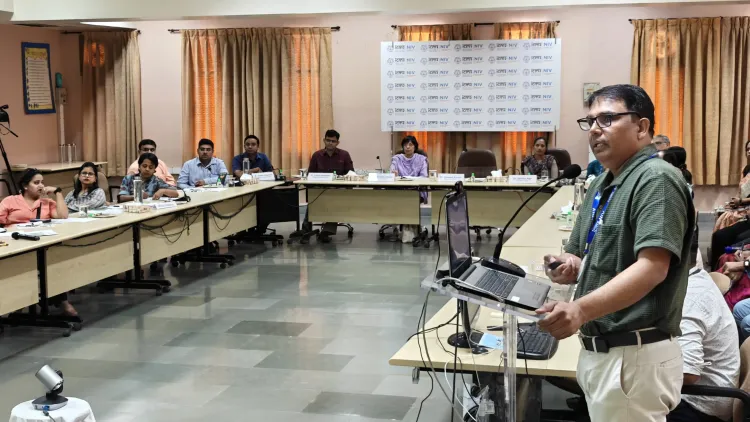How is ICMR-NIV Pune's Computing Facility Pivotal in India's Fight Against Future Pandemics?

Synopsis
Key Takeaways
- NAKSHATRA is a state-of-the-art HPC facility at ICMR-NIV Pune.
- It enhances India's genomic research and pandemic preparedness.
- Supports rapid data-driven responses to viral outbreaks.
- Facilitates early detection of disease threats.
- Revolutionizes bioinformatics workflows in India.
Pune, June 19 (NationPress) The newly launched high-performance computing (HPC) facility at the ICMR-National Virology Institute (NIV) marks a significant technological advancement in enhancing India's public health research capabilities.
As part of the vision for ‘Viksit Bharat 2047’, this state-of-the-art computing cluster, known as NAKSHATRA, is anticipated to greatly enhance genomic research and surveillance, thereby playing a vital role in the country’s pandemic preparedness.
This facility emerges at a time when the world faces increasing threats from numerous zoonotic spillovers—from animals to humans and vice-versa. This encompasses the SARS-COV-2 virus, responsible for the catastrophic Covid-19 pandemic, as well as H5N1, commonly recognized as bird flu, which has devastated both animal populations and human health.
According to Dr. Naveen Kumar, Director of ICMR-NIV, “The number of viral species identified by the International Committee on Taxonomy of Viruses (ICTV) has surged from just 290 in 1971 to 14,690 viral species and 314 families by 2023.”
Dr. Kumar noted that new viruses and genetic variants are being reported almost daily. “This surge is attributed to factors such as increased globalisation, global warming, and deforestation, which are fueling the emergence of novel pathogens,” he explained during a press conference.
The HPC facility has been developed under the Pradhan Mantri Ayushman Bharat Health Infrastructure Mission (PMABHIM) and is a key component of a new initiative named “High Performance Computing Next Generation Sequencing (NGS) Hub.”
This initiative is set to transform the processing of genomic and bioinformatics data in India, directly addressing the limitations faced during the Covid pandemic due to traditional computing resources.
Dr. Kumar emphasized that the HPC cluster will be instrumental in facilitating rapid, data-driven responses to viral outbreaks, ranging from Nipah to Crimean–Congo haemorrhagic fever (CCHF), West Nile, Zika, Covid, mpox, and H5N1 influenza A.
The NAKSHATRA HPC facility will significantly augment the country’s genomic surveillance and data analysis capabilities, preparing it for a technology-driven approach to pandemic preparedness and public health emergencies.
By enabling swift analysis of complex genomic data, the facility will empower scientists in India to detect new disease threats early. This will enhance outbreak response efficiency and accelerate the development of AI-driven vaccines and therapeutics.
Notably, the newly established HPC cluster comprises 12 compute nodes, which collectively offer 700 cores and 1 petabyte of storage.
It will facilitate intricate bioinformatics workflows, including NGS, transcriptomics, phylogenetics, metagenomics, and structural bioinformatics.
The facility will serve as a central repository for sequencing data and will extend support to Viral Research and Diagnostic Laboratories (VRDLs), initially catering to five ICMR institutes across the nation.
(Rachel V Thomas can be reached at rachel.t@ians.in)







